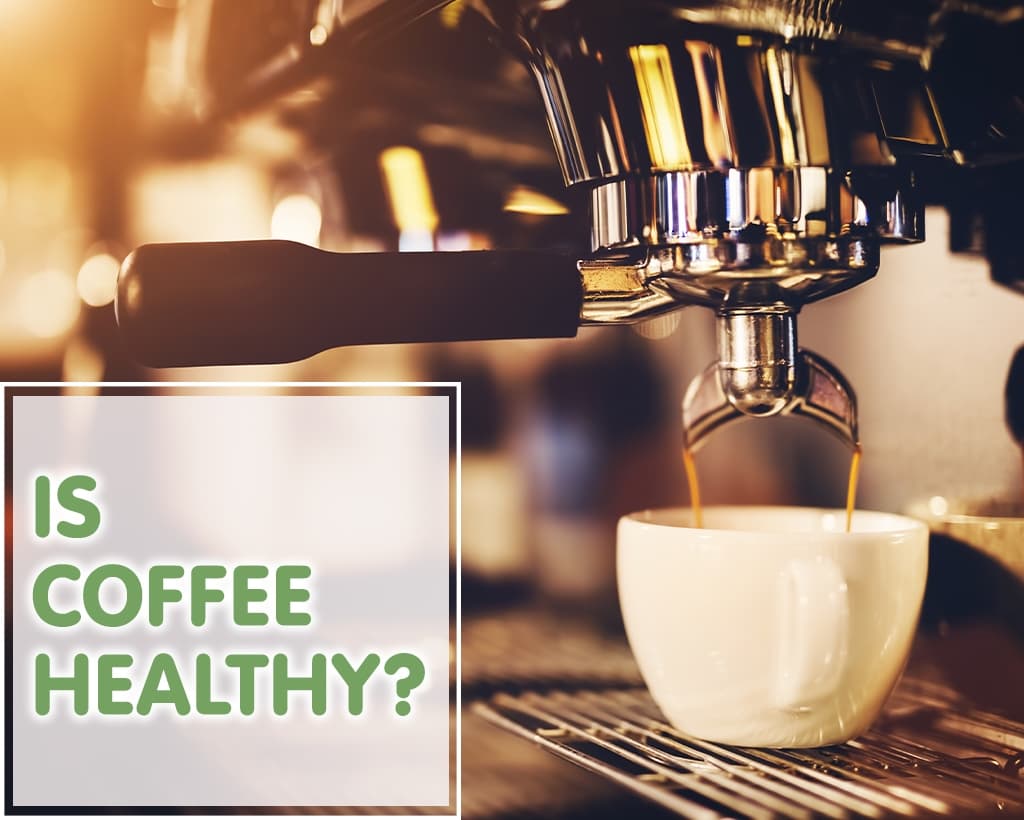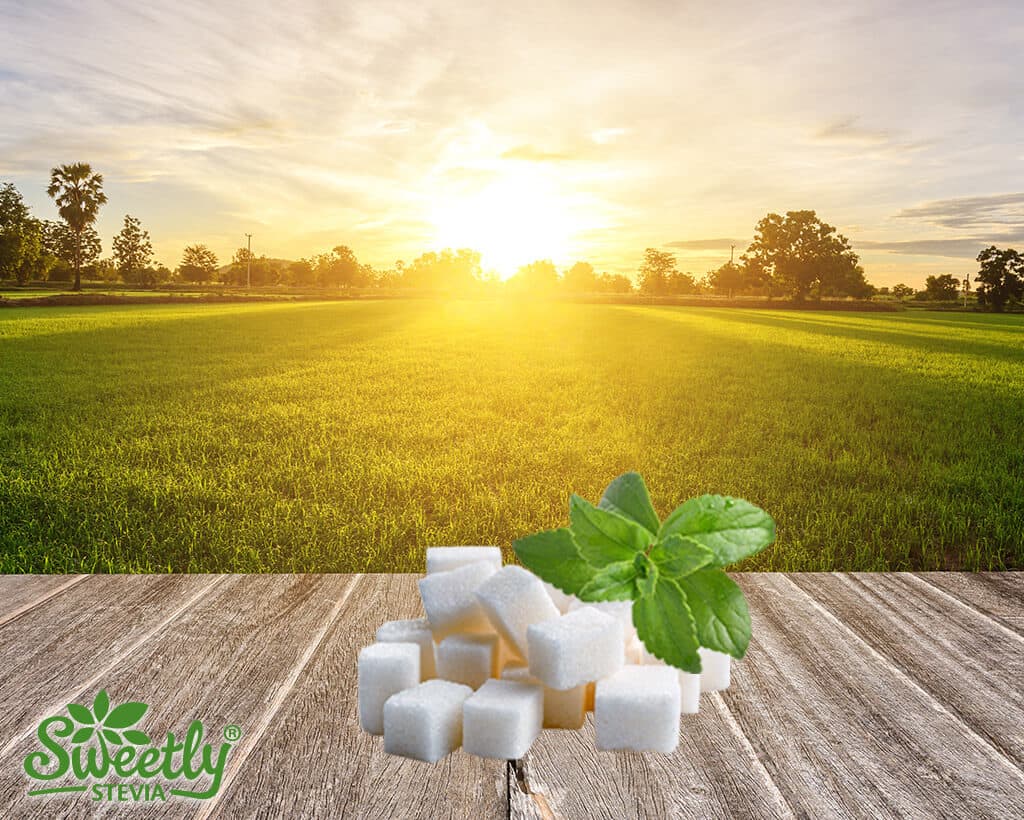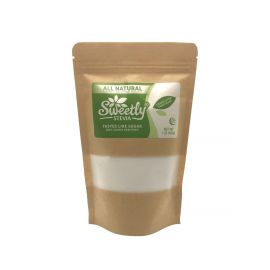Is Coffee Healthy?

If you've been keeping up with the Sweetly Stevia blog this month, then you've probably noticed that we've been taking a close look at coffee. We might even be a little obsessed with it. We took a deep dive into the History of Coffee in our most recent blog post to shed light on the otherwise mysterious origins of this worldwide cultural phenomenon, and in our Recipe section we included Iced Coffee, Coffee Creamer, and even Coffee Cake, all sweetened with Sweetly Stevia, of course!
Then we realized… have we gotten ahead of ourselves? We totally overlooked the most important question of all!
Is coffee even healthy?
We invite you to get comfortable as we explore the complex answer to this seemingly simple question. So, brew a fresh pot, pour a steaming mug, and inhale the delicious aroma of your favorite dark roast as we take a look at the health benefits--and also consequences--of drinking coffee.
First, there are established health benefits associated with drinking coffee that can be directly linked to coffee's caffeine content.
BOOSTS COGNITION
This is the #1 reason we love coffee! Whoo-hoo for mental clarity! Yes, coffee boosts cognition! It also positively affects the brain and its functions in other ways, according to countless research studies. Why is that?
Because the caffeine in coffee acts as a mild stimulant to the central nervous system. When the human central nervous system is stimulated, mental performance, mental and physical alertness, attention and concentration are all markedly improved. In fact, depending on the level of caffeine intake, the degree to which the person is jolted into a heightened state of mental acuity correlates. As little as 75mg of caffeine, or a regular-sized cup of coffee, has been shown to improve alertness, wakefulness, and response speeds. This can come in handy during situations where mental alertness and concentration is imperative, such as safety and performance during night shifts, night time driving, and also coping with jet lag in a new timezone. Thanks to coffee's positive influence over a person's mood and outlook, the boost in cognition can become truly powerful!
LOWERS RISK OF CONCENTRATION LULLS & MEMORY IMPAIRMENT
As a person ages, their memory can become affected, most notably, the short-term memory functions. Ever spend a frenzied 4 minutes looking for your glasses only to realize they're on your head? What about the last time you parked your car… and then couldn't find it? Or the classic--and also horrific--gasping moment when you get halfway down the block but seriously can't remember if you turned the burner off? Welcome to the wonderful world of subtle cognitive decline!
Concentration and memory impairment is a part of getting older, sure, but that doesn't mean we're going to take this lying down! After two strong cups of coffee, we'll probably still forget that our reading glasses are dangling around our necks, but it'll take us only a fraction of the time to remember that that's exactly where they are! This is a wonderful benefit that comes with regularly drinking coffee. Studies have shown that concentration is remarkably improved as well as memory. There are fewer short-term memory lapses and a reduced tendency to whirl around, confused, as soon as you enter a room--why did I come in here?? It's true. If you're a regular coffee drinker, then you can kiss confusion goodbye, or it's more likely the case that you rarely forget why you entered the kitchen in the first place!
MAY HELP PREVENT DEMENTIA, ALZHEIMER'S & EVEN PARKINSON'S DISEASE
Alzhiemers.net published research study findings that proved coffee reduced the amount of beta amyloid in the brain by as much as 50%. Why is this important? Because the presence of beta amyloid is an Alzheimer's marker. A destructive protein that is commonly found in the brains of people with Alzheimer's, beta amyloid is a bad sign, so anything we can do to prevent it from accumulating in the brain will be beneficial.
Drinking coffee daily may be helpful in assisting the body with eliminating and excreting beta amyloid. This information falls in line with, and supports, previous research that established how coffee can help fight Alzheimer's in the first place. And the benefits don't stop at Alzheimer's. Interestingly, most neuro-cognitive diseases, including dementia and even Parkinson's, have been shown to slow in development when the patient drinks coffee. Another study that was completed in 2012 found that drinking roughly three cups of coffee daily could slow and / or stop the transition from mild cognitive impairment to full-blown dementia. Though a delay in the onset of symptoms doesn't automatically mean the disease has been prevented, it is encouraging news and gives all of us one more reason to enjoy our daily java!
CAN KEEP APPETITE, AND BODY FAT, IN CHECK
A person's appetite is controlled by a complex network of interworking hormones, which are influenced by genetic, dietary, and environmental factors. We aren't about to tackle the science behind this. We're ambitious, but not that ambitious! However, coffee has been shown to have a suppressing influence on appetite. But how?
This, we can tackle! It isn't too hard to explain because we know that caffeine is an ergogenic, meaning it helps the body to spare muscle glycogen and delays fatigue despite physical exertion. Because coffee also contains chlorogenic acid--an active antioxidant that dulls "hunger pangs"--it becomes very effective at curbing a person's appetite. A single cup of coffee can delay those hunger hormones and what happens metabolically when a person puts off eating for even an extra hour is that the body will turn to burning body fat for energy. By burning straight body fat a little bit each day, you can lose weight and maintain control over your appetite, too! This is just one more reason to say "yes" to that morning cup of joe!
The downsides of coffee can be attributed to two main areas: the environment and conditions in which the beans are grown, and the side effects of direct caffeine consumption. Because these two areas are very different, let's separate them and take a close look at each.
PESTICIDES
In the age of organic, non-GMO, health consciousness, the last thing anyone wants is to wittingly eat pesticides… so brace yourselves, we've got some bad news. Caffeine is a pesticide.
We'll give you a moment to let that jarring information wash over you… Yup. Caffeine, whether found in tea leaves or coffee beans, is a pesticide, and we aren't talking a man-made one. Shocker though it may be, nothing in nature wants to be eaten… not even plants. Animals, for example, avoid being turned into wolf food by running away. Fight or flight is excellent in terms of keeping animals, insects, and aquatic life from being murdered by stronger, hungrier food-chain characters. Plants don't have fight or flight. They can't run away. But that doesn't mean they want you to eat them… We're looking at you, vegans!
The main defense mechanism that plants possess that keeps them from being devoured by fire ants, for instance, is the production of phytochemicals that are strong enough to paralyze and kill any insect that takes a bite. One of these phytochemicals, otherwise referred to as "natural pesticides", is nicotine… and another is--drum roll, please--caffeine.
Pesticide, insecticide, tomato, tomaaato… the fact of the matter is that caffeine doesn't kill us. It might even make us stronger!
ORGANIC VS. SPRAYED
Here we go. We're pretty sure that when you read the previous heading, "Pesticides", you were probably thinking "sprayed pesticides", so we'll address this clear-and-present downside now. The caffeine in coffee beans can't keep every bug at bay, and what this means is that many producers of coffee are on the side of protecting their crop from insects and pests by using chemical sprays. This is a downside, clearly.
Coffee beans, when growing on the bush, do not make up the whole fruit, but rather these beans are the inner "seed pit" of the plant's "fruit". This matters, because as far as conventional coffee producers are concerned, any synthetic fertilizers, chemicals, or pesticides used in the growing process does not directly "touch" the end-product, i.e. the coffee beans. However, for proponents of organic coffee, these chemical contributing factors are highly toxic and detrimental to human health.
Here's the thing. If the chemicals that are used in conventional coffee production truly were "detrimental to human health", then you could bet the FDA would never allow the sale of conventional, non-organic coffee to take place in the U.S. Now, that being said, logic prevails that a bean grown without the use of chemicals will undoubtedly be healthier than a bean that's grown with chemical sprays, which is why we included "Organic vs. Sprayed" on our list of health risks.
MOLD VS. ANTIFUNGAL EFFORTS
Coffee can be moldy. There. We said it. And we're not picking on coffee, either. Nuts are notoriously moldy, as are rice, dried beans, loose tea leaves… any and all organic matter. Well, that's going a little far, but you get the point. You think that coffee beans that are harvested, dried, stored, and then shipped from South America or Africa to destinations on the opposite sides of the world won't develop a little mold before they get there?? Come on, now!
But rest assured… at least a little bit… there are methodical testing practices in place as well as "thresholds" that have been established per most countries. What this means is that if a coffee producer in South America, for example, wants to sell beans to France, then they have to test their beans for mold and turn over the report. If the mold and mycotoxin presence exceeds the country's threshold, then that country will not import the product.
We know what you're probably thinking and it's something along the lines of, wait you mean coffee beans can have a little mold on them? It's gross, but yeah. The mycotoxins that come with that mold, though, should be the real health concern. For some individuals with genetic disorders, gene "defects", and certain autoimmune diseases, ingesting mycotoxins can be a real problem. However, for most people who have efficient detox systems working well within their bodies, these mycotoxins are excreted easily and don't pose any kind of serious health risk. Similarly to the previous section, though, we should mention that efforts to prevent mold from growing on coffee beans, such as antifungal sprays, pose their own health risks. If you want to avoid this too, then stick with buying organic.
Coffee's other downside area has to do with the side effects of caffeine consumption and what coffee does to the human body. Though earlier in this article we covered the health and bodily benefits, those must be juxtaposed by the downsides. So, here we go!
CHASED BY A TIGER
Let's be perfectly honest, here. Caffeine isn't natural. We aren't supposed to consume it. As we highlighted earlier, caffeine--like nicotine--is a natural pesticide that the plant developed to keep insects from eating it. In a certain sense, having caffeine is synonymous to being given a low dose of poison. For this reason, pregnant women are advised not to drink coffee or consume caffeine. Likewise, children aren't served dark roast. Coffee, for the average adult, impacts the body most noticeably in the adrenal system by stressing it out… big time.
In other words, as far as your adrenal glands are concerned, you aren't drinking coffee… you're being chased by a tiger. Seriously. We're talking into-the-wild, caveman-esque levels of authentic stress are being triggered every time you down a cup. Studies in humans have shown, in fact, that caffeine causes cortisol and epinephrine to spike. Those are two of our bodies' main stress hormones. What this means is that drinking coffee creates real stress conditions for the body and your adrenal glands take the brunt of it.
But isn't that what we like about coffee? The focus. The mental alertness. The ninja-like reflexes. The almost superhuman levels of unexplainable energy. When you drink coffee, you are the opposite of relaxed, but that's the point. However, for some individuals, the stress on the adrenal system can cause an adverse effect, i.e. consuming coffee can cause chronic fatigue.
INTERACTS NEGATIVELY WITH CERTAIN MEDICATIONS
Ah, drugs. Who isn't on at least one? We're being cheeky, of course. Not everyone is taking a medication, but a lot of people are… and they're also drinking coffee. Doing so can come with health risks, especially if you're taking birth control, psychiatric and depression drugs, thyroid medication, or the antibiotic Cipro which is most commonly prescribed to fight UTIs--wink, wink, all y'all ladies on the birth control know what we're talking about… circle of life, right?
First and foremost, if you're on any medications, then it's important to consult your doctor before you add a stimulant into the mix, even if that stimulant is only caffeine. Better to be safe than surprised in a scary way. But let's address the downsides you could face, starting with drinking coffee while taking psychiatric medications for anxiety and depression. These kinds of medications are meant to calm and relax the individual in addition to serving other psychiatric functions. Because coffee is a stimulant--one that makes the body feel like it's being chased by a tiger--the caffeine it contains is destined to negatively interact with prescribed drugs that are meant to calm the person down. It's like throwing both water and gasoline onto a fire, and depending on the actual prescription, reactions could become problematic. And because nothing goes without saying, if you take a stimulant, i.e. coffee, it's going to affect your sleep, which means that if you're on sleep aid medications, you really aren't doing yourself any favors.
Caffeine, and coffee, has been shown to be problematic for some women who are on birth control pills because prescription birth control actually decreases how efficiently the body can metabolize caffeine. When the body takes much longer to break down caffeine for this reason, yet the person continues to drink coffee, then there is an increased risk of jitteriness, headaches, fast heartbeat, and other "anxiety-like" symptoms. So, be careful and mindful if you're on the pill, especially if you're a longtime coffee drinker who only recently started taking this particular medication. The good news is that caffeine doesn't decrease the effectiveness of the birth control, phew! However, caffeine does decrease the effectiveness of the antibiotic Cipro… something to bear in mind.
DIURETIC, DIARRHEA & ACID REFLUX
While using a mild diuretic can be helpful, coffee is also acidic and contains fiber, which could cause you to have to race to the bathroom. But let's unpack this, shall we?
There's nothing wrong with diuretics, i.e. anything that compels your body to excrete sodium and excess water. Water pills, for example, are a common diuretic that helps the kidneys regulate sodium and water in order to decrease the overall amount of fluid flowing through your veins and body. This can be especially helpful for people who struggle with water retention or even severe cases of edema that cause the lower extremities to swell so much with water that a person has difficulty walking.
But what happens when a person isn't retaining excess water but they ingest a diuretic like coffee? Well, accidental dehydration is a risk. If you're peeing out sodium and water, feeling vaguely thirsty after, and drinking more coffee, you might get into trouble. And the trouble could become complicated if the coffee also causes digestive upset such as diarrhea, which is also known to dehydrate.
The fact of the matter is that for certain people who are prone to acid reflux and heartburn, coffee might not be the best choice due to its acidity. That being said, if you are susceptible to acid reflux and heartburn, so long as you have food in your stomach and don't drink your coffee "black", then you'll greatly reduce your chances of having an adverse effect when drinking coffee.
Now that we've laid it all out for you, you tell us… is coffee healthy? It really depends on you!
If you like your coffee sweet, but want to avoid adding extra, empty sugar calories to your daily dietary needs, it's time for you to try the all-natural sweetener stevia. Sweetly Stevia is chemical and additive free, zero calories, and sweet enough to satisfy even the most serious sugar craving.















